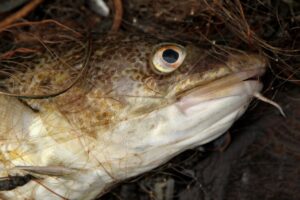Excessive fishing has forced Baltic cod to undergo genetic changes that have halved their size over the past 30 years, a new study has found.
The research, published in the journal Science Advancesis the first to show that decades of overfishing and environmental change can profoundly alter the genetic make-up of a fully marine species.
Baltic cod once measured more than a meter long and weighed up to 40kg, forming the backbone of the region’s fishery. In the last three decades, however, the species has shrunk so much that even a full-grown cod can fit neatly on a dinner plate.
“For the first time in a fully marine species, we have provided evidence of evolutionary changes in the genomes of a fish population subjected to intense exploitationwhich has pushed the population to the brink of collapse,” lead author Kwi Young Han said.

Photo taken during a research expedition in 1987 with Finnish fisheries biologist Eero Kalevi Aro (Jesper Bay, Danish Institute for Fisheries and Marine Research)
Researchers examined an archive of ear stones from 152 overexploited Eastern Baltic cod, Years Morhuacaught in the Bornholm Basin between 1996 and 2019. The ear stones record annual growth in some fish speciessimilar to tree rings, making them valuable timekeepers.
They specifically looked into the growth trends of the cod over 25 years of heavy fishing and compared the changes with genetic alterations found in the species at the full genome level.
The study revealed a “48 per cent decrease in asymptotic body length” of the cod from 1996 to 2019, with indications that the species had evolved due to human interference.
Genetic variations in the cod associated with body growth showed signs of “directional selection”, researchers pointed out.

Dr Kwi Young Han holds a cod fish (Thorsten Reusch, GEOMAR)
Some structural changes in the genome seemed to indicate environmental adaptation, hinting the “shrinking” had a genetic basis tied to human activity.
“Selective overexploitation has altered the genome of Eastern Baltic cod,” Dr Han explained. “We see this in the significant decline in average size, which we could link to reduced growth rates.”
The study found the genomes of fast-growing cod differed systematically from slow growers, with the fast growers nearly disappearing from the Baltic.
“When the largest individuals are consistently removed from the population over many years, smaller, faster-maturing fish gain an evolutionary advantage,” Thorsten Reusch, another author of the study, said. “What we’re observing is evolution in action, driven by human activity. This is scientifically fascinating, but ecologically deeply concerning.”
The new research calls for conservation policies to look into the adaptive potential of marine species.











